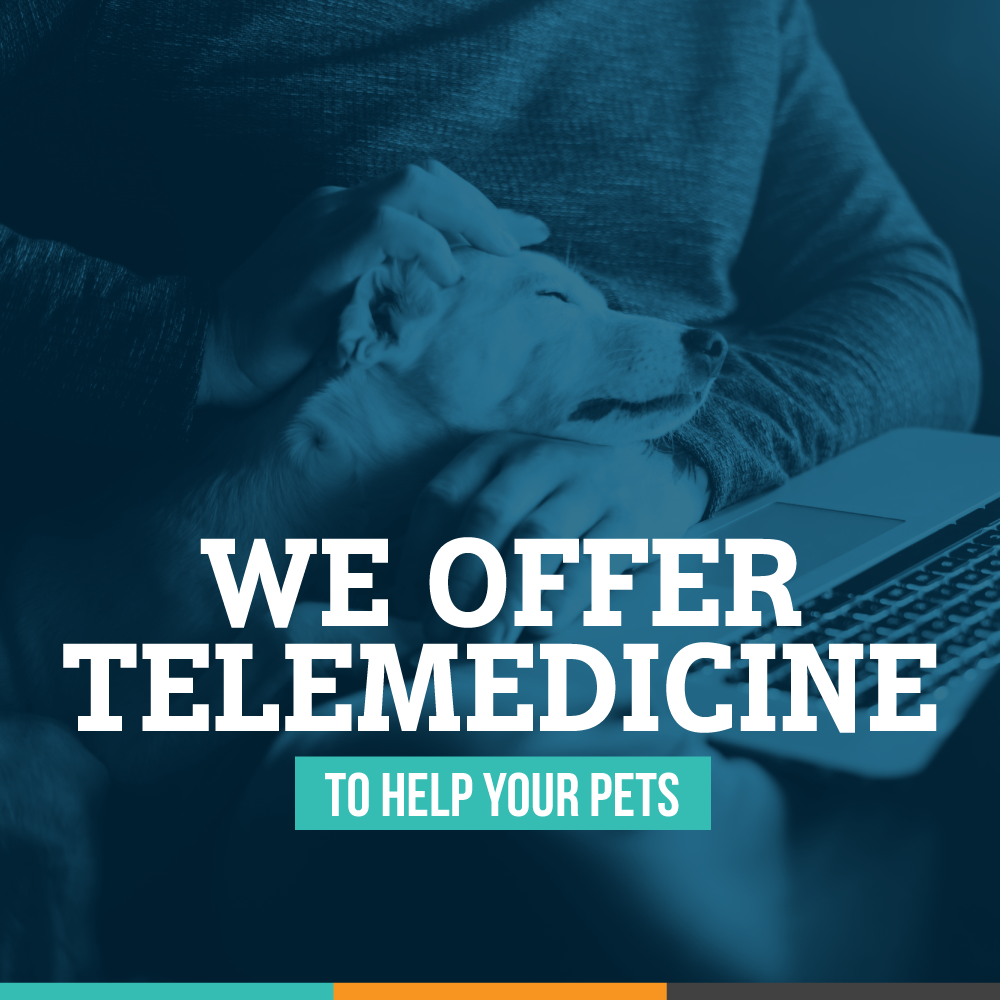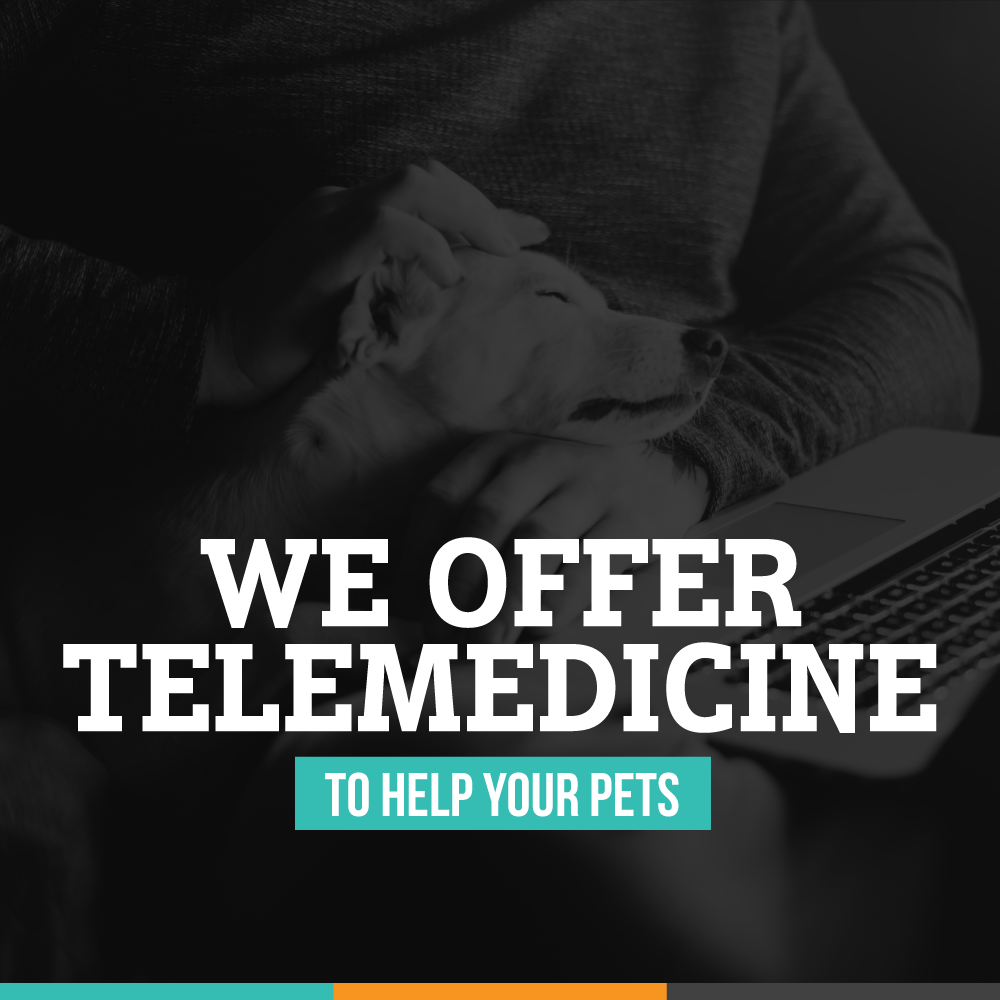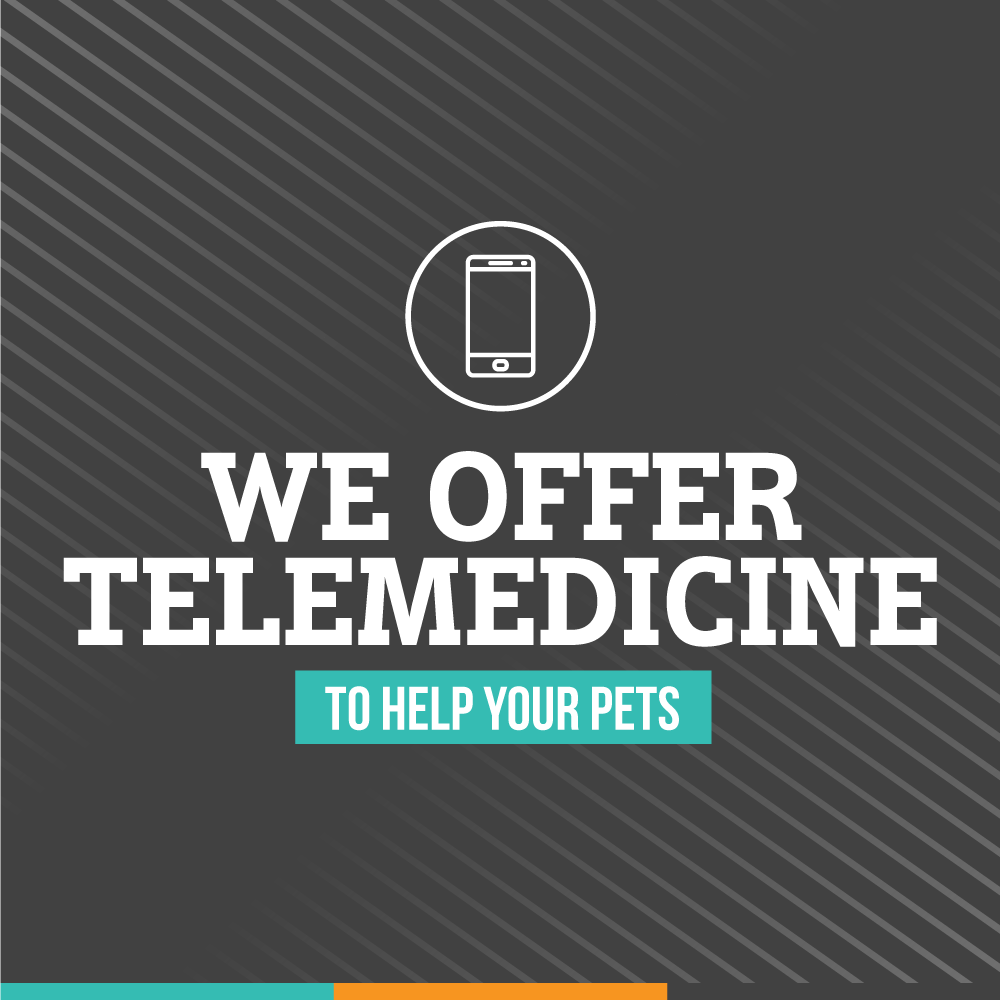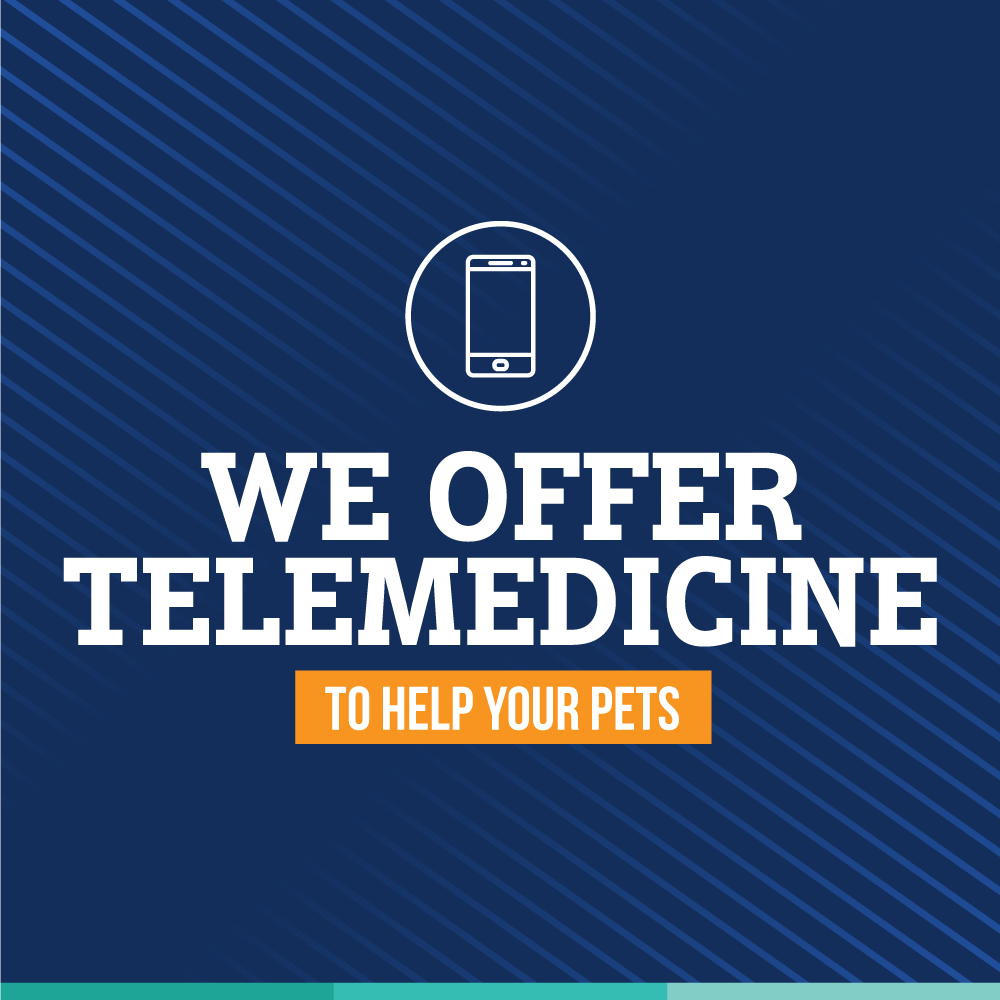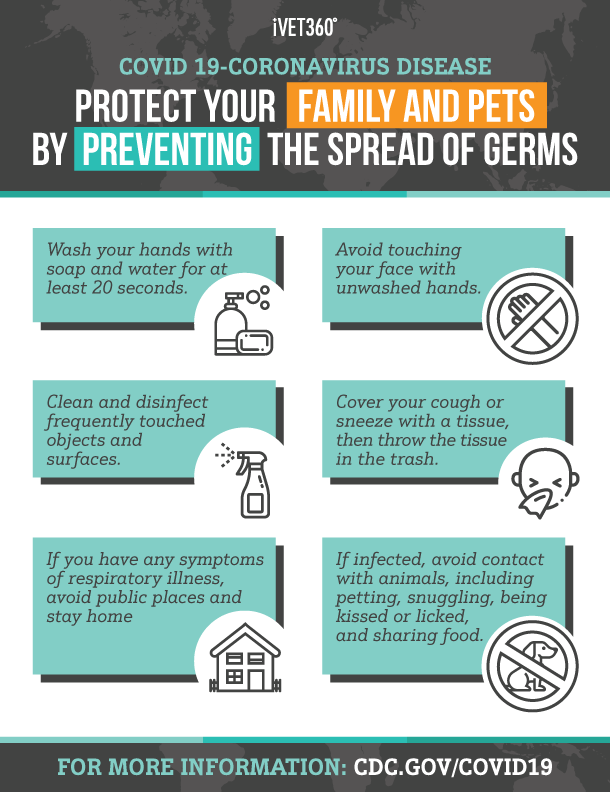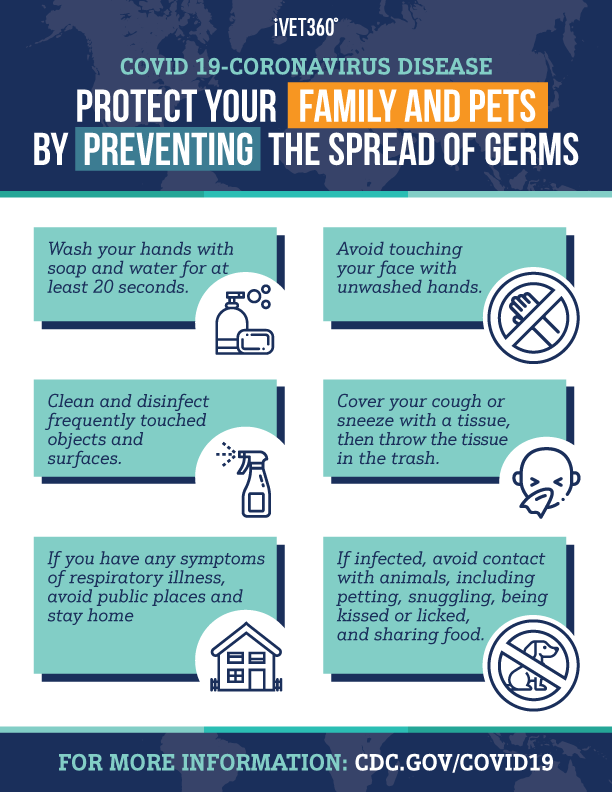We wanted to remind you that, even though the state mask mandate has been lifted, we are still requiring all clients to wear face coverings when interacting with our staff. Our decision in this matter comes down to our mission as a medical facility. Should a member of our team fall ill, we would be forced to close the hospital, meaning pets would miss out on crucial care. If you have any questions about our COVID-19 safety protocols, don’t hesitate to give us a call at [HOSPITAL PHONE]. Thanks in advance for your understanding and cooperation and for being the best pet parents around!
Category: Posts
Just when you thought you had social distancing in the bag, the Centers for Disease Control and Prevention (CDC) is now recommending that your pets follow social distancing guidelines as well. (Insert sad dog emoji here).
While there’s no evidence that animals can pass the virus to humans, there are some confirmed cases where coronavirus has passed from a person to an animal.
So…what do you do if you have a new puppy that absolutely must have some meet & greets? Puppies have a limited window of time in the first four months which can significantly influence how they behave as adults, so it’s critical they experience new environments, people, and other animals. Skip it, and your pup could develop behavioral issues like fear aggression, separation anxiety or dog-to-dog reactivity.
But don’t panic. There are lots of fun experiences you can share with your new baby that don’t include new people and new dogs.
1. Surfaces. Introduce your puppy to a variety of surfaces to walk on like grass or gravel outside, carpet or wood floors inside. Be creative; see if your puppy will walk on a spread-out newspaper, paper bags or even a baking sheet. Try a dip in the tub—without water. Take things slowly, let your pup set the pace and offer lots of praise and rewards.
2. Handling. Practice handling for future visits to the vet or groomer. Try slowly massaging all parts of the body, including paws so nail trimming won’t be scary. If your pup is too young to go for walks, get him or her used to the weight of a leash attached to the collar.
3. Introductions at a distance. Sit on your porch, patio or lawn with your leashed pup and watch other dogs and people go by. As he gets older, go for short adventure walks or scavenger hunts—while maintaining appropriate social distance, of course.
4. Virtual socialization and training. Many trainers and training facilities are offering virtual puppy classes, and there are many online training resources and litters of great YouTube videos specifically for puppies as well. Puppies are even having their own ZOOM playdates, though sadly, they do lack the all-important rear sniffing component.
5. Sounds and scents. Doorbells, vacuum cleaners, car engines, bicycles, skateboards—your puppy needs exposure to anything they might encounter that makes sudden and/or loud noise. You can drop a can full of pennies, open an umbrella, or even have your phone ring loudly, then encourage your dog to remain calm.
6. DIY stranger. Dogs of all ages are having to adjust to greeting masked strangers, and it’s going to be important moving forward that your pup is ok with this. Try hats, glasses, and wigs, and get your family members to dress up, too.
7. Schedule and routine. Puppies and adult dogs do best on a schedule, and just like with human children, canine kids need a nap around the same time each day. Your pup also should learn to be calm when he is alone because sooner or later you’ll have to leave him by himself. A Kong-type toy stuffed with canned dog food or a frozen treat is a great idea so that he associates good things with your leaving.
In the end, you will eventually need direct contact to properly socialize your puppy, and if you are healthy and not at high risk for complications from COVID-19, you might consider playdates with another dog owner or two who is also healthy and willing.
If that’s not an option, the above activities will certainly help get you started. You can also check out the resources below for more ideas:
Short answer: Probably not.
The transmission of the novel coronavirus, which causes the disease COVID-19, is primarily from person to person. That said, two domestic felines and several big cats at a zoo in New York have tested positive for the virus, and it is believed they were infected by their human caretakers.
All the infected animals had a mild respiratory illness and are expected to recover.
This week, veterinarians were cleared to begin testing pets for coronavirus. However, that doesn’t mean that all pets should be tested. At this time, the only animals being tested are those who have symptoms consistent with the novel coronavirus and who
- have had exposure or close contact with a person confirmed to have COVID-19, or
- exposure to a high-risk environment where an outbreak occurred.
So what are the symptoms to watch for in your pet? General respiratory illness and diarrhea have been the most common signs, but unless your cat has been exposed to the virus in one of the ways above, it is not likely your pet has COVID-19.
The most important thing to remember at this point is that while our knowledge of this virus is still evolving, there is little to no risk of animals transmitting the virus to people.
If you or someone in your household has tested positive for the virus, please don’t hesitate to give us a call at [HOSPITAL TEL NUMBER] and we can have you talk with one of our veterinarians about testing for your pet.
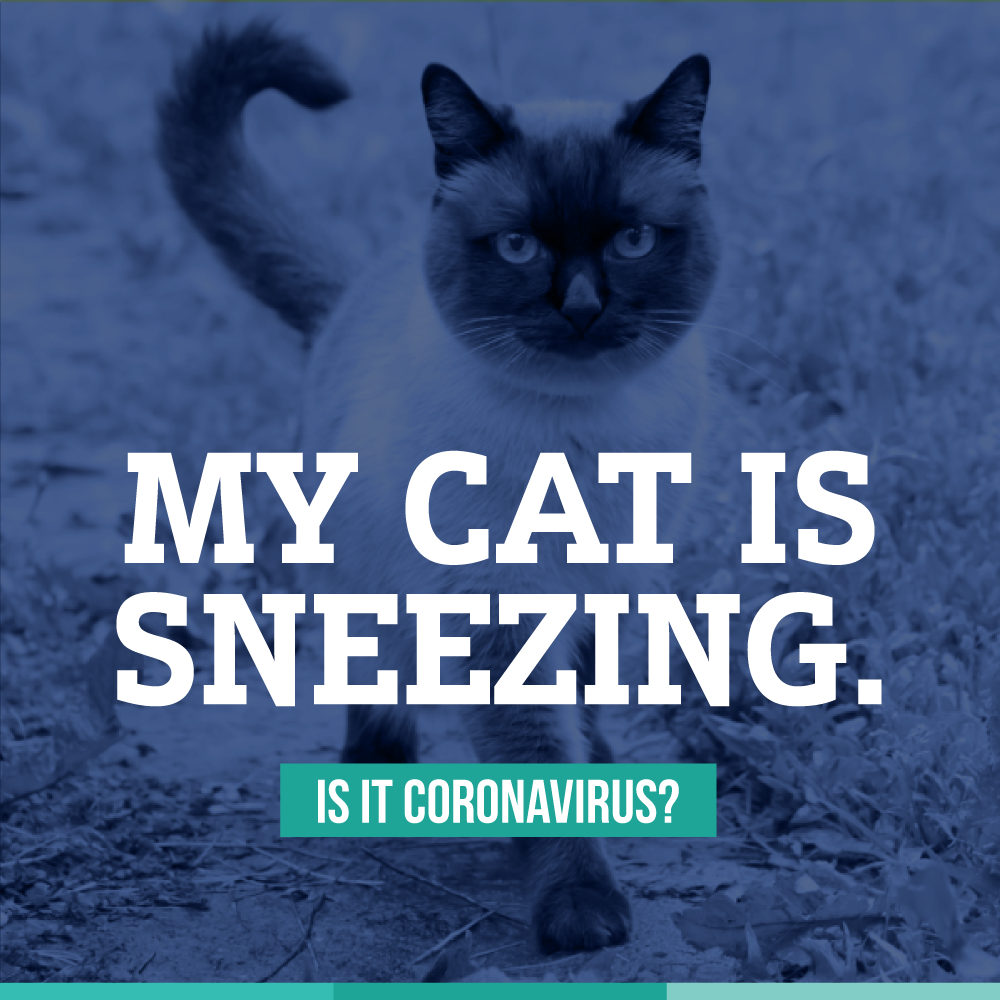




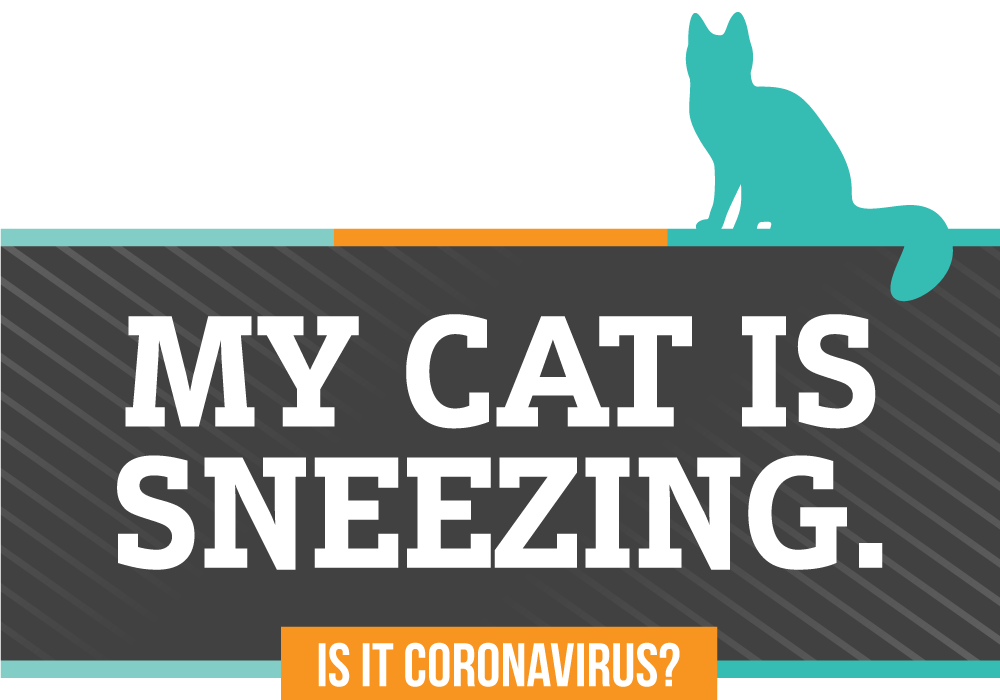
Keeping your pet healthy and happy at home
If you’re working from home, sheltering in place or self-isolating, you’re no doubt spending more time with your pets. We can help you can keep them healthy and happy until their next office visit with these 10 pet-care tips, many of which take just 10 minutes.
- Keep your pet’s coat clean and in good condition with regular brushing. Check for parasites, lumps or anything unusual you can report to us at your next visit.
- Are you brushing your pet’s teeth? This may be a good time to learn how to provide good oral care to your dog or cat.
- Give your cat or dog a massage to reduce anxiety, increase flexibility and improve circulation.
- Are you stress baking? Try these vet-approved dog treats for a healthy alternative to commercial treats.
- Keep up with your dog’s regular outdoor exercise routine, maintaining socially appropriate distances from other people.
- Fun exercise indoors: If you have a long hallway or a staircase, toss a toy or a tennis ball for your dog to chase. Offer praise and a treat if he brings it back and drops it.
- Cats chase balls, too – will yours? Give it a try and be sure to offer a tasty treat as a reward.
- Teach your dog a new trick with short positive reinforcement training sessions.
- Keep up with heartworm and flea and tick medications so your pets don’t develop secondary problems like hot spots, allergies and tick-borne disease.
- Read your email aloud to your dog. Too boring? Try Three Stories You Can Read to Your Dog.
In addition to trying out these tips, you can create a pet profile for an emergency pet caregiver, in case one is needed. Include our contact information, medical conditions and medications, food preferences as well as any behavioral tendencies. If you don’t already have one, create a pet disaster preparedness kit. Include the pet profile you created.
Consider fostering or even adopting a new friend to help your local shelter or make a donation to your favorite animal welfare organization. Keep informed and remember we are here to help [insert phone number].
Social Media Post
IMAGE TEXT:
Important COVID-19 Veterinary Services Update
POST TEXT:
To preserve much-needed medical supplies and keep you and our staff safe during the COVID-19 outbreak, we are requesting that you reschedule or postpone routine and non-essential care for your pet including annual exams, dental care and elective surgeries such as spay/neuter and non-malignant mass removals. We will be rescheduling these appointments and remain open for urgent care and emergency cases utilizing curbside and drop-off services. Please do not hesitate to call us if your pet is showing symptoms of any kind and we can help you determine if your pet needs to see us or can wait—we are here to help and to answer your questions: [HOSPITAL TEL NUMBER]
Client Email
Subject line:
COVID-19 notice: important veterinary services update
Preview text options:
Due to COVID-19 restrictions, we have implemented changes in hours, policies and procedures
Keeping You and Your Pet Healthy: COVID-19 Update
In light of the recent shelter in place restrictions due to COVID-19, we are making some necessary changes to our procedures and are asking our clients to help us all get safely through this difficult time.
Until further notice, we are requesting that all clients reschedule or postpone their annual exams, routine vaccinations, and nonessential procedures such as spay/neuters, non-malignant mass removals, and dentals.
This is not only to minimize contact between staff and clients but also to preserve much-needed medical equipment. All nonessential visits will be rescheduled until the shelter in place has been removed.
We are asking that new clients and those who are unsure whether your pet needs to see a veterinarian call us first so we can determine if your pet needs to see us or can wait.
We will be open for urgent, emergency and essential services, which include:
- Life-threatening injuries
- Life-threatening or painful illness
- Gastric dilation-volvulus (bloat)
- Cesarean sections
- Poison or non-food object ingestion and removal
- Respiratory issues/choking
- Pet not eating/drinking
- Pet with chronic diarrhea/vomiting
We will no longer allow clients into the building to practice social distancing and protect each other. When you arrive at the hospital with your pet, please call us to inform the staff you are outside: [HOSPITAL TEL NUMBER]
- A member of our staff will come out and get your pet while you remain in your vehicle during the exam, and the doctor will either call or video call you during the exam.
- You will receive a verbal estimate of appointment costs at that time, and a staff member will call you to receive payment via the phone.
- When the appointment is over, a staff member will bring your pet to your car with any meds or food that were prescribed.
- We ask that if you are feeling ill that you inform us as there will be different precautions used when examining your pet. Although there have not been reports of pets becoming sick with COVID-19, we are still unsure if pets can harbor the coronavirus on their body.
- If you are ill with COVID-19, please try to have another member of your household take care of walking, feeding, and playing with your pet. If you have a service animal or you must care for your pet, then consider wearing a face mask and don’t share food, kiss, or hug your pet. Also, make sure to wash your hands before and after any contact with your pet or service animal. You should not share dishes, drinking glasses, cups, eating utensils, towels, or bedding with other people or pets in your home. Additional guidance on managing pets in homes where people are sick with COVID-19 is available from the CDC at this link.
We very much appreciate your understanding and cooperation at this difficult time so we can continue to ensure your pets get needed veterinary care. Please don’t hesitate to call us at [HOSPITAL TEL NUMBER] if you have any questions or concerns.
Social Media Post:
To make sure our clients, staff, and patients stay as safe and healthy as possible, we are utilizing telemedicine for many appointments via the [TELEMEDICINE APP]. While not suitable for urgent or emergency care, telemedicine is easy and convenient to use for follow-up care, allergies, coughs, diabetic care, gastrointestinal problems, medication refills, hospice care, parasite prevention and treatment and more. Download [TELEMEDICINE APP] here: [Link to app download or refer them to App Store or Google Play] Questions? Just give us a call at [HOSPITAL TEL NUMBER].
Newsletter Article:
We Offer Telemedicine To Help Your Pets
In light of COVID-19 concerns, we have taken steps to make sure our extended community remains as safe as possible. We are now offering digital appointments to complement ongoing in-office care through [TELEMEDCINE APP].
If you are interested in connecting digitally, you will need to download the [TELEMEDCINE APP].
Some important details:
- [TELEMEDICINE APP] connects you with our veterinary team, not a third-party veterinarian. [NOT TRUE WITH ALL APPs]
- Consultations will cost [AMOUNT, DIFFERS FOR EACH APP]
- Not all ailments are good fits for telemedicine, and [TELEMEDICINE APP] is not suitable for urgent or emergency care. Currently, only clients with smartphones will be able to utilize this service.
What is suitable for telemedicine visits?
- Allergies
- Coughing, sneezing, URI signs
- Dermatology
- Diabetic care and management
- External parasites (fleas, ticks, mites, etc.)
- Gastrointestinal upsets, intestinal parasites
- Hospice care
- Lameness evaluations
- Limited mobility patients and clients
- Medication refills
- Nutritional counseling
- Progress exam
- Stressed/anxious pets
- Suture checks
Please call us immediately at [HOSPITAL TEL NUMBER] if you think your pet may need urgent or emergency care.
We are going to do our very best to be available to you and your pets; however, coverage is limited to working hours. You can anticipate a one-hour turn-around around in response, but we may occasionally be delayed due to an in-office emergency.
Social Post
Image text:
Home Delivery of Meds & Pet Food Available!
We Offer Home Delivery of Pet Meds and Prescription Foods
To ensure that our patients get the medications, prescription foods and other products they need right now, we want to remind you that we have a trusted online pharmacy partner who can deliver your pet’s supplies to your door. Shipping is free on many orders, and there’s also an AutoShip option that will send your pet’s regular meds and foods to you on schedule. There’s a link on our website homepage or you can just follow this one: [LINK TO ONLINE PHARMACY]
Newsletter
Subject line
Home delivery of meds & pet food available!
Preview text
Our online pharmacy partner can deliver your pet’s meds, prescription foods & other supplies right to your door!
We Offer Home Delivery of Pet Meds and Prescription Foods
To ensure that our patients get the medications, prescription foods and other products they need during this difficult time, we want to remind you that we have a trusted online pharmacy partner who can deliver your pet’s supplies directly to your home.
Our online pharmacy partner works hand in paw with us to make sure the meds and products your pet gets are safe and handled properly so they are effective and all guarantees stay intact.
Shipping is free on many orders, and there’s also an AutoShip option that will send your pet’s regular meds and foods to you on schedule. There’s a link right on our website homepage or you can just click here to go directly to the site right now: [LINK TO YOUR WEBSITE ONLINE PHARMACY]
As always, the health and safety of our clients and their pets are our priority. We remain open at this time with precautions in place to minimize the spread of any viruses and germs should you need to bring your pet in to see a doctor or pick up prescriptions at the hospital. Please don’t hesitate to call us at [HOSPITAL TEL NUMBER] if you have any questions, concerns or need to make an appointment.
Is Your Hospital in Need of an Online Pharmacy?
The Covetrus online pharmacy platform, to include Atlas and Roadrunner compounding, can be utilized to provide your owners with the food and medications they need, without leaving their home. This protects your revenue and, most importantly, their family and yours. PSIvet has negotiated an exclusive discount on platform fees for our members.
To learn more or to enroll, please click here.
VetSource – In partnership with your practice, this trusted online pharmacy and pet supply retailer offers streamlined e-prescribing tools, online ordering, home delivery, auto-ship, compounding and more for you and your clients. They’ve also teamed with TeleVet to provide telemedicine.
Social Post Content Options
#Flattenthecurve is more than just a slogan, it needs to be a way of life for a while. These little things can make a big difference, especially when it comes to stopping the spread of viruses and bacteria.
Six little things you can do right now to make a big difference when it comes to the spread of viruses and bacteria. #flattenthecurve
Our hospital is taking precautions to ensure that you and your pets stay safe at our hospital. Here are six things you can do where you are to help us #flattenthecurve
What you need to know about coronavirus to protect your family and your pet
Obviously, many pet parents are concerned about the spread of coronavirus, also known as COVID-19, and how to protect their families and their pets. The good news is that at this time, the U.S. Centers for Disease Control and Prevention (CDC) and the World Health Organization (WHO) say there is no evidence that companion animals, including pets, can spread COVID-19. Nor is there currently any evidence that we can transmit the virus to them. However, as information about this virus is still developing, there are precautions you should take to protect your family and pets, including:
- WASH YOUR HANDS – use soap and water for at least 20 seconds, and especially after coughing, sneezing, contact with others or with animals. If soap and water are not available, use hand sanitizer.
- Avoid touching your face with unwashed hands.
- If you have any symptoms of respiratory illness, stay home and restrict your contact with your companion animals
- Those infected with COVID-19 should avoid contact with animals, including petting, snuggling, being kissed or licked, and sharing food.
- Know the symptoms – they are similar to influenza fever, cough, and shortness of breath.
We are actively monitoring developments related to animals and the virus, and you can find the latest updated information about COVID-19 as it relates to pets on the AVMA’s coronavirus page. You are also welcome to give us a call with your questions at [HOSPITAL TEL NUMBER].
With coronavirus, or COVID-19, dominating the headlines, you might be wondering, “How does this affect me and my pet?” The truth is, there is still a great deal we don’t know about this novel virus. Its origin is still under investigation, and whether pets can actually contract it is still a matter of debate. (There was a case in Hong Kong of a weak positive test in a dog, but, according to numerous news sources, pets can carry but are not susceptible to the disease.)
Now that cases of COVID-19 are being reported in the U.S., the main objective is to prevent the disease’s spread, and there are several steps you can take to minimize its impact on your family. Our advice to our pet parent clients is very similar to that of what your primary physician might recommend and follows closely the guidelines put forth by the Center for Disease Control and Prevention:
- Wash your hands often and thoroughly, particularly after touching animals.
- If at all possible, avoid people who are displaying symptoms of COVID-19. These include coughing, sneezing, and trouble breathing.
- If you’re sick, stay home, and try to avoid close contact with your pet while you’re symptomatic.
- Stock up on your pet’s medication. As the disease progresses around the globe, pharmaceuticals might be hard to come by. And in the event of a home quarantine situation, you don’t want to run out.
- Skip the face masks. They don’t really protect you from the virus, and it’s crucial that protective gear is reserved for people who really need it, like healthcare workers who regularly come in direct contact with the sick.
Bottom line? Plan ahead, be responsible and don’t panic. If you’d like more information about COVID-19 and pets, check out this article from the American Medical Veterinary Association. And you’re always welcome to contact us [HOSPITAL NAME & PHONE] with questions or concerns.




